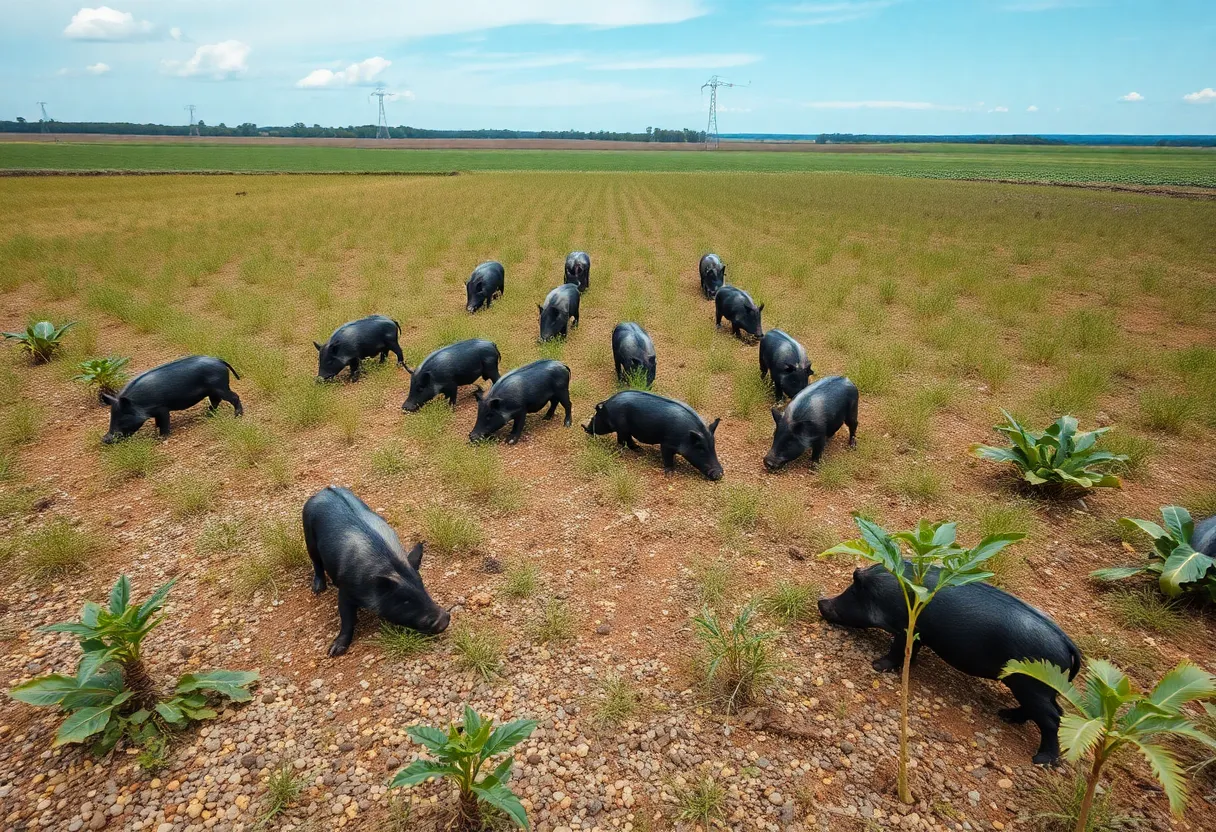News Summary
Feral hogs are causing significant crop losses for Georgia farmers, with annual damages exceeding $100,000 in the southwestern region. A study from the University of Georgia highlights the damaging effects of these invasive species on crucial crops, including peanuts, corn, and cotton. With no natural predators, feral hog populations continue to grow, exacerbating the challenges faced by local agriculture. Implementing effective management strategies is essential to mitigate this escalating issue and protect the livelihoods of farmers throughout the state.
Albany, Georgia — Feral hogs are causing substantial crop damage for farmers in Georgia, with recent research indicating that losses exceed $100,000 annually in the southwestern part of the state. The findings from the University of Georgia’s Warnell School of Forestry and Natural Resources highlight the extent of the problem, particularly affecting crops such as peanuts, corn, and cotton.
The study, conducted between 2021 and 2022, used drones to monitor 14 fields and evaluate the impact of feral hogs on farmland. These invasive wild pigs uproot seeds, trample young plants, and can even damage farming equipment, making them a significant threat to agricultural production. The most critical times of damage occur approximately 10 days after seeds have been planted, leading to extensive losses for farmers eagerly waiting for their crops to grow.
Georgia holds the title of the leading peanut producer in the United States, accounting for 52% of the nation’s total peanut production. The ongoing damage caused by feral hogs not only threatens local farmers but also has larger implications for the state’s agricultural output.
Feral hogs are recognized as an invasive species with no natural predators in North America, which allows their populations to grow rapidly. Their ancestry can be traced back to domesticated pigs that European settlers introduced to the U.S. in the 1500s. As a result, the current population continues to disrupt local wildlife and plant ecosystems, as they compete for resources in the environment.
To mitigate the damage caused by feral hogs, farmers often resort to methods such as trapping and hunting. Research emphasizes the importance of proactive elimination strategies to significantly reduce crop loss. Timing is crucial; laying bait during off-seasons can help lower hog populations effectively. Whole sounder trapping, a technique that involves capturing groups of hogs, is regarded as the most influential control strategy. Additionally, aerial removal methods utilizing helicopters coordinated with ground teams have shown promise in successfully culling hog populations.
The Georgia Department of Natural Resources (DNR) has also begun the Hog Down Awards Program, which encourages landowners to take action against feral hog populations. By meeting specific criteria, including the proof of culling at least 10 hogs, landowners can qualify to win a $3,500 whole-sounder feral hog trap, promoting community involvement in addressing the problem.
Feral hogs are not just a localized issue; they contribute to an estimated $1.6 billion in agricultural damages annually across the United States. Experts believe that continuous management efforts are critical in keeping these populations under control. Given feral hogs’ rapid reproduction rates, where sows can breed as early as six months old, long-term population control remains a complex challenge.
Effective strategies for managing feral hog populations require organized cooperation among landowners and ongoing monitoring of the invasive species. Without sustained efforts, the risk of further agricultural losses in Georgia and beyond will likely continue to rise, impacting the livelihood of farmers and the agricultural industry as a whole.
Deeper Dive: News & Info About This Topic
- AJC: Feral Hogs Destroying Crops
- Google Search: feral hogs Georgia
- MSN: Wild Pigs Costing Georgia Farmers
- Wikipedia: Feral hog
- 13WMAZ: Hog Down Awards Program
- Encyclopedia Britannica: Pig
- Online Athens: Wild Pigs Causing Damage
- Google Scholar: feral hogs agriculture
- Pork Business: Complicated Cost of Wild Pigs
- Google News: feral hogs agriculture

Author: STAFF HERE AUGUSTA WRITER
The AUGUSTA STAFF WRITER represents the experienced team at HEREAugusta.com, your go-to source for actionable local news and information in Augusta, Richmond County, and beyond. Specializing in "news you can use," we cover essential topics like product reviews for personal and business needs, local business directories, politics, real estate trends, neighborhood insights, and state news affecting the area—with deep expertise drawn from years of dedicated reporting and strong community input, including local press releases and business updates. We deliver top reporting on high-value events such as Arts in the Heart Festival, Westobou Festival, and Masters Week. Our coverage extends to key organizations like the Augusta Metro Chamber of Commerce and Greater Augusta Arts Council, plus leading businesses in manufacturing and healthcare that power the local economy such as Textron Specialized Vehicles, Cardinal Health, and Nutrien. As part of the broader HERE network, including HEREAtlanta.com and HERESavannah.com, we provide comprehensive, credible insights into Georgia's dynamic landscape.


